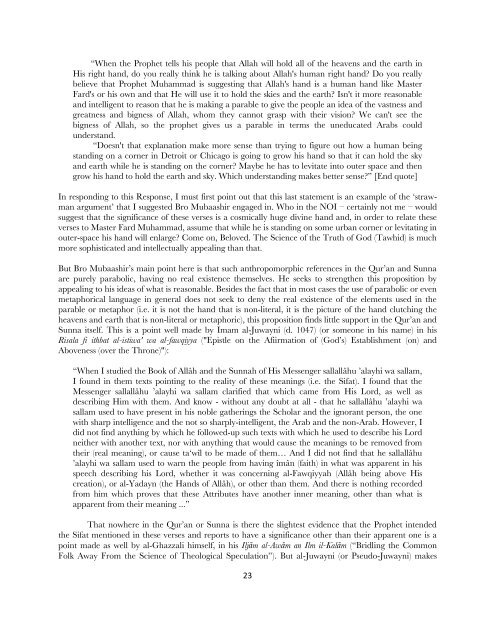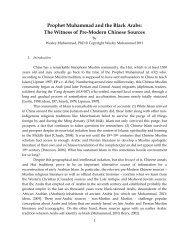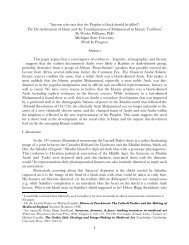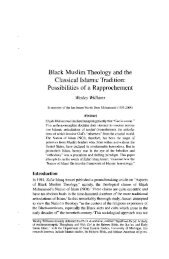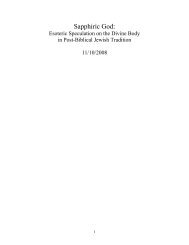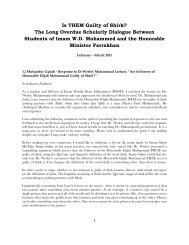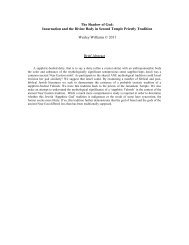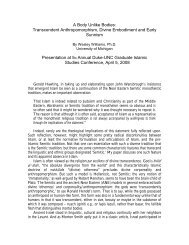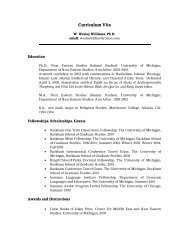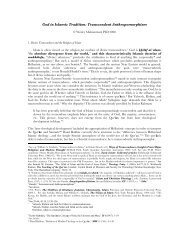Is THEM Guilty of Shirk? - Dr. Wesley Muhammad
Is THEM Guilty of Shirk? - Dr. Wesley Muhammad
Is THEM Guilty of Shirk? - Dr. Wesley Muhammad
Create successful ePaper yourself
Turn your PDF publications into a flip-book with our unique Google optimized e-Paper software.
―When the Prophet tells his people that Allah will hold all <strong>of</strong> the heavens and the earth in<br />
His right hand, do you really think he is talking about Allah's human right hand? Do you really<br />
believe that Prophet <strong>Muhammad</strong> is suggesting that Allah's hand is a human hand like Master<br />
Fard's or his own and that He will use it to hold the skies and the earth? <strong>Is</strong>n't it more reasonable<br />
and intelligent to reason that he is making a parable to give the people an idea <strong>of</strong> the vastness and<br />
greatness and bigness <strong>of</strong> Allah, whom they cannot grasp with their vision? We can't see the<br />
bigness <strong>of</strong> Allah, so the prophet gives us a parable in terms the uneducated Arabs could<br />
understand.<br />
―Doesn't that explanation make more sense than trying to figure out how a human being<br />
standing on a corner in Detroit or Chicago is going to grow his hand so that it can hold the sky<br />
and earth while he is standing on the corner? Maybe he has to levitate into outer space and then<br />
grow his hand to hold the earth and sky. Which understanding makes better sense?‖ [End quote]<br />
In responding to this Response, I must first point out that this last statement is an example <strong>of</strong> the ‗strawman<br />
argument‘ that I suggested Bro Mubaashir engaged in. Who in the NOI – certainly not me – would<br />
suggest that the significance <strong>of</strong> these verses is a cosmically huge divine hand and, in order to relate these<br />
verses to Master Fard <strong>Muhammad</strong>, assume that while he is standing on some urban corner or levitating in<br />
outer-space his hand will enlarge? Come on, Beloved. The Science <strong>of</strong> the Truth <strong>of</strong> God (Tawhid) is much<br />
more sophisticated and intellectually appealing than that.<br />
But Bro Mubaashir‘s main point here is that such anthropomorphic references in the Qur‘an and Sunna<br />
are purely parabolic, having no real existence themselves. He seeks to strengthen this proposition by<br />
appealing to his ideas <strong>of</strong> what is reasonable. Besides the fact that in most cases the use <strong>of</strong> parabolic or even<br />
metaphorical language in general does not seek to deny the real existence <strong>of</strong> the elements used in the<br />
parable or metaphor (i.e. it is not the hand that is non-literal, it is the picture <strong>of</strong> the hand clutching the<br />
heavens and earth that is non-literal or metaphoric), this proposition finds little support in the Qur‘an and<br />
Sunna itself. This is a point well made by Imam al-Juwayni (d. 1047) (or someone in his name) in his<br />
Risala fi ithbat al-istiwa' wa al-fawqiyya ("Epistle on the Afiirmation <strong>of</strong> (God‘s) Establishment (on) and<br />
Aboveness (over the Throne)"):<br />
―When I studied the Book <strong>of</strong> Allâh and the Sunnah <strong>of</strong> His Messenger sallallâhu ‘alayhi wa sallam,<br />
I found in them texts pointing to the reality <strong>of</strong> these meanings (i.e. the Sifat). I found that the<br />
Messenger sallallâhu ‘alayhi wa sallam clarified that which came from His Lord, as well as<br />
describing Him with them. And know - without any doubt at all - that he sallallâhu ‘alayhi wa<br />
sallam used to have present in his noble gatherings the Scholar and the ignorant person, the one<br />
with sharp intelligence and the not so sharply-intelligent, the Arab and the non-Arab. However, I<br />
did not find anything by which he followed-up such texts with which he used to describe his Lord<br />
neither with another text, nor with anything that would cause the meanings to be removed from<br />
their (real meaning), or cause ta‗wîl to be made <strong>of</strong> them… And I did not find that he sallallâhu<br />
‘alayhi wa sallam used to warn the people from having îmân (faith) in what was apparent in his<br />
speech describing his Lord, whether it was concerning al-Fawqiyyah (Allâh being above His<br />
creation), or al-Yadayn (the Hands <strong>of</strong> Allâh), or other than them. And there is nothing recorded<br />
from him which proves that these Attributes have another inner meaning, other than what is<br />
apparent from their meaning ...‖<br />
That nowhere in the Qur‘an or Sunna is there the slightest evidence that the Prophet intended<br />
the Sifat mentioned in these verses and reports to have a significance other than their apparent one is a<br />
point made as well by al-Ghazzali himself, in his Iljām al-Awām an Ilm il-Kalām (―Bridling the Common<br />
Folk Away From the Science <strong>of</strong> Theological Speculation‖). But al-Juwayni (or Pseudo-Juwayni) makes<br />
23


